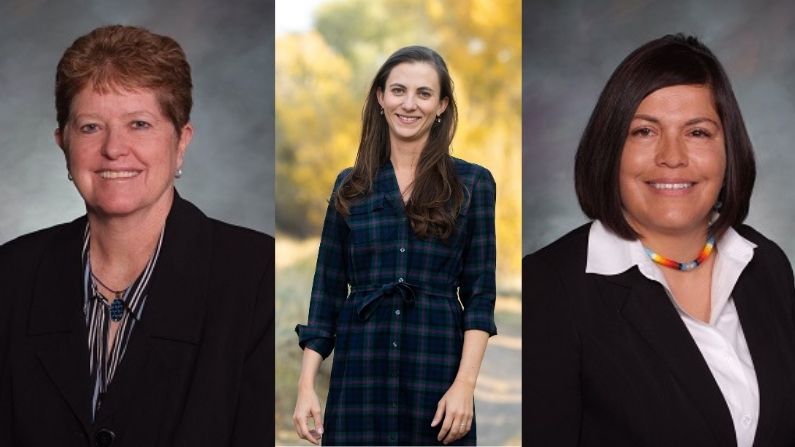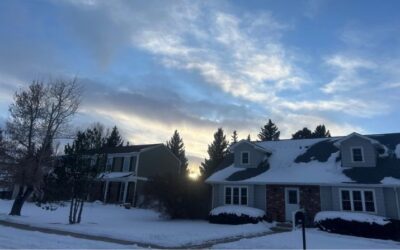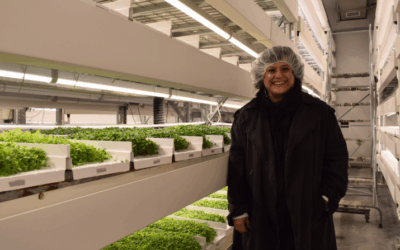Democratic Representative Andi Clifford of Riverton has overcome more challenges than most women to claim a seat in the Wyoming House of Representatives.
“It’s a system that wasn’t designed for my participation, right?” she said. “One as a woman and then one as an Indigenous woman.”
Clifford is Wyoming’s first woman Northern Arapaho representative. She’s also among the just 18 percent of women lawmakers in the state legislature, according to the Center for American Women and Politics at Rutgers University. That figure ranks the so-called “Equality State” 45th in the country in terms of women’s political representation in state legislatures. So, women across the political spectrum in Wyoming share at least one minority status.
“We need more. I’ll be quite honest. We need more women to run,” said State Senator Wendy Davis Schuler, a Republican representing Uinta County in the southwest corner of the state.
A new report timed to coincide with the celebration of Women’s History Month, titled, “Wyoming Women in Elected Roles,” from the Wyoming Women’s Foundation (WWF) and the Equality State Policy Center aimed to determine the root causes of why there are so few women like Clifford and Schuler serving in elected office at both the state and local levels in Wyoming.

The new report found that the percentage of women serving in the Wyoming State Legislature has dropped steadily since the early 1990s, when the state eliminated multi-member districts. (Wyoming Survey and Analysis Center at the University of Wyoming)
“This particular topic is new to us,” said WWF Director Rebekah Smith. “This is the first time we’ve done it.”
The foundation has a mission of helping women achieve economic self-sufficiency, and it turns out that economics is one of the major factors that prevents women from serving in public office, according to the report. Women spend much more time doing unpaid labor than men, including nine hours more per week actively engaged in childcare and 14 hours more providing secondary childcare—that is, watching children while simultaneously grocery shopping, cooking or doing other household or community tasks.
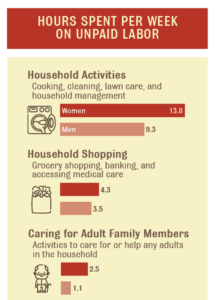
Women spend more time than men doing unpaid household and community labor per week, according to the report. (Wyoming Survey and Analysis Center at the University of Wyoming)
“This can present a barrier to those other types of activities that they’re pursuing, including serving in an elected office,” Smith said.
Then there’s the gender wage gap: Wyoming women earn just $0.68 cents for every $1 that men earn, according to the Wyoming Department of Workforce Services. That means women have less discretionary income to spend on campaigning or to give up for a part-time, notoriously low-paying legislative session in Cheyenne.
“I think in general, more people in our population, including more women, could consider running for the legislature if it wasn’t a financial burden to do so,” Smith said. “We’re not criticizing anyone who’s currently in office by saying that we’d like to see more women. We’d just like to see the opportunity for more voices that match the population that we see in Wyoming.”
Despite the harsh financial realities outlined in the report, there is a silver lining: In 2020, women candidates actually had higher median campaign funds than men. Additionally, 60 percent of Wyoming women polled last year said they wouldn’t rule out the possibility of running for office at some point in the future.
“The 60 percent would not rule it [running] out and the fundraising component were two delightful surprises for me in the report,” said Natalia Macker, chairwoman of the Teton County Board of County Commissioners. Macker is a Democrat, but despite their different party affiliations, she shares a similar story to Sen. Schuler of what inspired her to run for office in the first place.
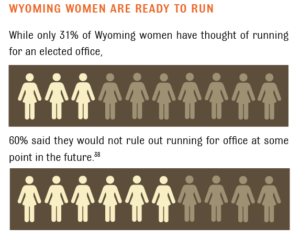
A 2020 poll found that 60 percent of Wyoming women wouldn’t rule out running for elected office at some point in the future. (Wyoming Survey and Analysis Center at the University of Wyoming)
“I had visited the legislature with Leadership Jackson Hole, and I was surprised in 2013 or whatever it was, that there were so few women,” Macker said. “[I] looked around at the people that were making decisions that were going to impact my life and made the mistake of complaining about it to a friend from college on the phone who then suggested that I run for office.”
“I looked probably five, six years ago. There was only one senator that was a female senator,” Schuler said. “One out of 30. And that did bother me. I have to admit that that was something that maybe—maybe helped push me over the edge.”
Over the edge and into the political fray, where Schuler added that it does help to have thick skin.
“You may end up, I want to say, ticking some people off a little bit because your views may not match theirs. But I was a coach for a lot of years. I was a teacher and a coach. And I told someone, I said, ‘Heck, this political stuff doesn’t bother me at all.’”
Rep. Clifford, from the Wind River Indian Reservation, said she’s had to spend her life breaking stereotypes among both Indigenous and non-Indigenous men—and she has advice for others who might want to follow in her path.
“Don’t rush or hurry on your journey of leading. It’s gonna take time, and I think as women we really bring and provide a stability and a vision and longevity, because of our experiences and the perspectives we bring as women,” she said, “and I think that complements a lot of the tough issues that come before us in society.”
Clifford’s message reflects the conclusion of the new report and several others that women in office are more likely to support policies that benefit women and children, who are disproportionately impacted by poverty.
In short, Macker said women add a different and critical perspective to legislative discussions.
“More often than not, I’ve been pleasantly surprised by how receptive [male] colleagues are and that it isn’t an intentional dismissiveness of a perspective, it’s just never occurred to them.”
All of the women leaders KHOL spoke to encouraged potential future candidates to think about serving at the local level first, which eliminates some of the challenges of serving in Cheyenne. To break those down, the new report found that lawmakers will need to work on big issues like closing the gender wage gap if the state ever wants to truly deserve its nickname championing equality.

